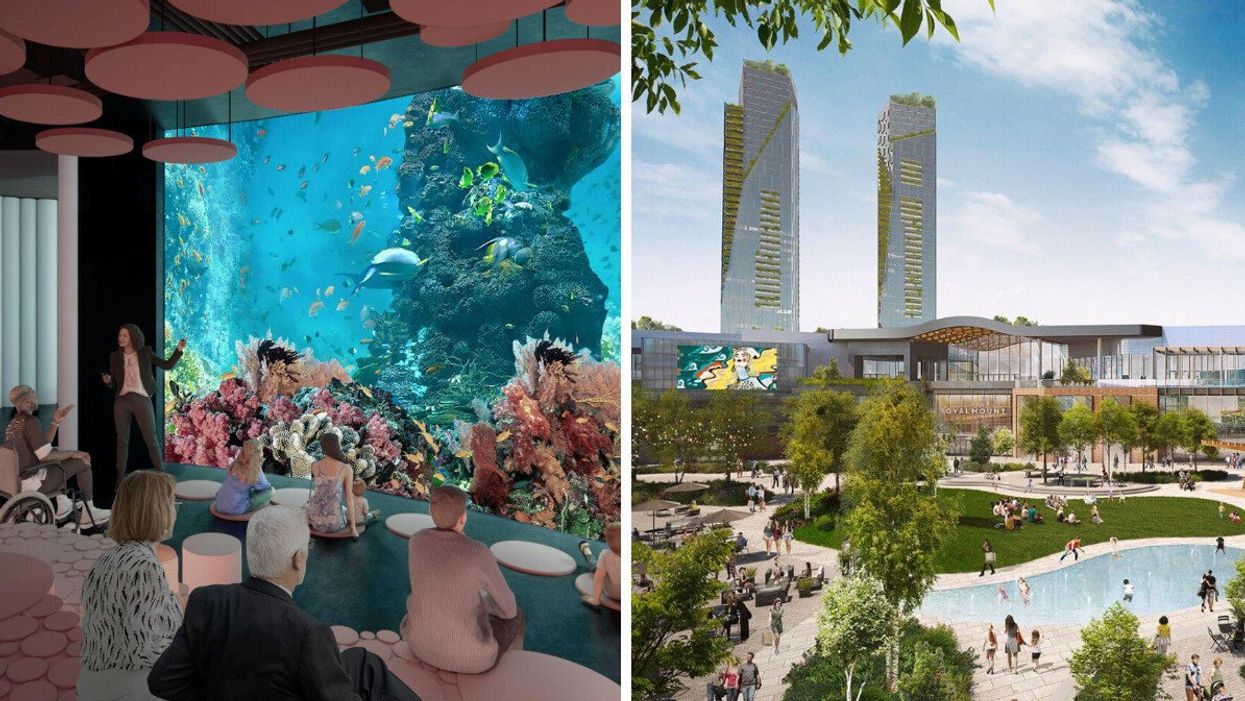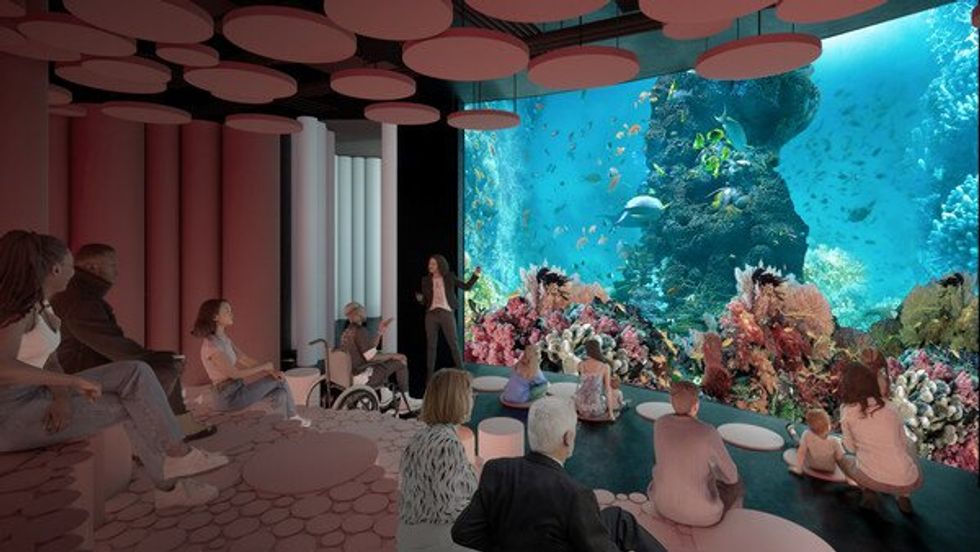Montreal Is Getting An Ambitious New Aquarium — Here's What You Can Expect
We dove into the details.🤿

A rendering of the planned Aquarium de Montréal in the Royalmount development. Right: A rendering of the Royalmount development.
Montreal is getting a new aquarium — and relatively soon. Developers plan to open its doors to the public next year.
Unlike the Montreal Insectarium and Montreal Biodôme, the Aquarium de Montréal will be privately owned and operated.
In fact, it's set to be one of the flagship attractions at one of the most contentious developments in the city.
Here's everything we know so far.
What will the Montreal Aquarium look like?

A rendering of the planned Aquarium de Montréal in the Royalmount development.
CNW Group/Groupe Écorécréo Inc.
The Ecorecreo Group, which already operates 16 recreational sites in Quebec, will be responsible for the development and management of the aquarium, which it promises will be a "world-class" institution.
Though it won't be huge. In a statement shared with MTL Blog, Aquarium de Montréal Director General Nicolas Gosselin said it will be of "medium size compared to other aquariums in the market" with a roughly half-kilometre-long visitor route.
The project is nevertheless ambitious.
Developers say there will be both marine and freshwater habitats, though Gosselin couldn't yet confirm the number of species or tanks.
He added that it will "be designed to be experienced rather than simply visited" with a public section he vaguely described as "cutting edge, immersive and inspiring."
The exact design of the aquarium is still in development. There's only one rendering out so far, showing a stepped theatre facing a large tank.
We also know the space will be universally accessible.
Where will the Montreal Aquarium be located?
The aquarium will be just one of the attractions in the controversial Royalmount mega-mall project.
The development is rising in a former industrial plot between Highways 40 and 15 in the Town of Mount Royal.
It's set to have condos (which critics warn could strain municipal services in the exclusive on-island suburb), office suites, restaurants, and luxury retailers, such as Louis Vuitton, Gucci, and Tiffany & Co.
And in addition to an aquarium, Royalmount will feature a water park, spa and performance venue.
Despite concerns about additional traffic on the already-busy neighbouring highways, developers are pitching Royalmount as a new urban destination. They've already dubbed the erstwhile industrial wasteland Montreal's "Midtown."
In a press release, Tourisme Montréal CEO Yves Lalumière hailed the planned aquarium as a new "asset to the city, not only as a tourist destination but also as a place to make connections and learn."
What do developers have to say about the Montreal Aquarium's mission and ethics?
Aquariums — really any facility that holds animals in captivity — are controversial.
While animal welfare organization American Humane considers aquariums ethical when they seek independent certification and pursue conservation, for example, the Animal Welfare Institute raises concerns about the effects of captivity on fish's quality of life and criticizes parts of the aquarium industry that rely on the "production, acquisition, and death" of animals.
Gosselin says the Aquarium de Montréal will have high standards of animal care with "enriching, positive behavioural" programs and "stimulating environments." It's collaborating with the Université de Montréal Department of Veterinary Medicine to develop what the aquarium general manager called "breeding, rehabilitation and conservation projects."
The aquarium is currently looking to hire a director of animal care, a life support systems technician, and an aquarist to lead facility and care planning.
"Our goal," Gosselin told MTL Blog, "is to work on concrete solutions to concrete issues that affect the aquatic environments around Montreal, either by ourselves or in collaboration with existing stakeholders."
"Humans created the problems facing our aquatic friends and only humans can solve them," he added. "Humankind has a responsibility to improve our relationship with the environment and to repair the damage that may have been done. Aquariums must be part of the solution."
"This can only be done through research, rehabilitation, education, and the creation of impactful experiences that will motivate future generations, while ensuring that the animals we care for live in a habitat that is healthy."
- Montreal's New Royalmount Mall Announced Its First Stores & Some Are A First For Quebec ›
- Royalmount - MTL Blog ›
- Everything We Know About Montreal's New Royalmount Mega-Mall ›
- Montreal’s Royalmount mega-mall is opening soon — here’s which stores to expect - MTL Blog ›
- Montreal's Royalmount is opening soon — here's how you'll be able to access the mega-mall - MTL Blog ›
- Montreal’s Royalmount mega-mall is getting a European-style food hall — here’s what to expect - MTL Blog ›
